Tiếng Anh 11 Smart World Unit 2 Lesson 2
Tiếng Anh lớp 11 Unit 2 Lesson 2 trang 18
Giải bài tập SGK tiếng Anh 11 Smart World Unit 2 Generation Gap Lesson 2 hướng dẫn giải chi tiết các phần bài tập trong Sách giáo khoa tiếng Anh lớp 11 i Learn Smart World giúp các em học sinh chuẩn bị bài tập tại nhà hiệu quả.
Tiếng Anh 11 Smart World Unit 2 Lesson 2
Bản quyền thuộc về VnDoc nghiêm cấm mọi hành vi sao chép vì mục đích thương mại
Let’s Talk!
In pairs: What’s the problem in the picture? What are some other reasons for arguments between parents and teenagers?
(Vấn đề trong bức tranh là gì? Một số lý do khác cho cuộc tranh luận giữa cha mẹ và thanh thiếu niên là gì?)

Gợi ý đáp án
In the picture, the boy is playing games too much and the mother is not happy with this.
Some other reasons for arguments between parents and teenagers are that:
- teenagers don’t study hard at school, don’t help parents with housework, watch TV too much, spend too much time on their mobile phones, do don’t their homework.
- parents set too many rules for teenagers, which make them feel uncomfortable.
New Words
a. Read the words and definitions and fill in the blanks. Listen and repeat.
(Đọc các từ và định nghĩa và điền vào chỗ trống. Lắng nghe và lặp lại.)
Bài nghe
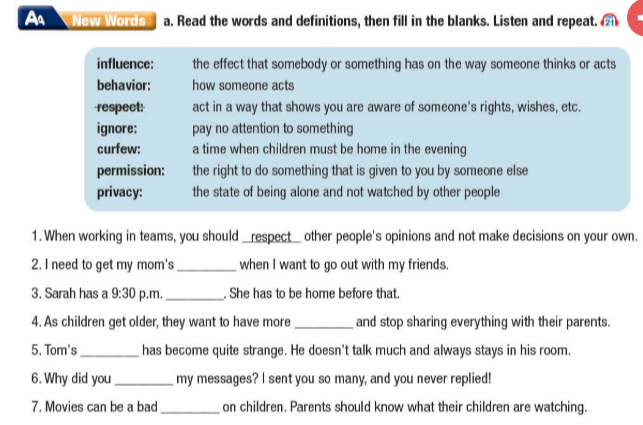
Gợi ý đáp án
|
1. respect |
2. permission |
3. curfew |
4. privacy |
|
5. behavior |
6. ignore |
7. influence |
Lời giải chi tiết
1. respect (v): tôn trọng
When working in teams, you should respect other people's opinions and not make decisions on your own.
(Khi làm việc theo nhóm phải tôn trọng ý kiến của người khác, không được tự ý quyết định.)
2. permission (n): sự xin phép
I need to get my mom's permission when I want to go out with my friends.
(Tôi cần phải xin phép mẹ khi muốn đi chơi với bạn.)
3. curfew (n): giờ giới nghiêm
Sarah has a 9:30 p.m. Curfew. She has to be home before that.
(Sarah có 9:30 tối. Lệnh giới nghiêm. Cô ấy phải về nhà trước đó.)
4. privacy (n): riêng tư
As children get older, they want to have more privacy and stop sharing everything with their parents.
(Khi lớn hơn, trẻ muốn có nhiều không gian riêng tư hơn và ngừng chia sẻ mọi thứ với cha mẹ.)
5. behavior (n): hành vi
Tom's behavior has become quite strange. He doesn't talk much and always stays in his room.
(Hành vi của Tom đã trở nên khá kỳ lạ. Anh ấy không nói nhiều và luôn ở trong phòng của mình.)
6. ignore (v): bỏ qua
Why did you ignore my messages? I sent you so many, and you never replied!
(Tại sao bạn bỏ qua tin nhắn của tôi? Tôi đã gửi cho bạn rất nhiều, và bạn không bao giờ trả lời!)
7. influence (n): ảnh hưởng
Movies can be a bad influence on children. Parents should know what their children are watching.
(Phim ảnh có thể ảnh hưởng xấu đến trẻ em. Cha mẹ nên biết những gì con cái họ đang xem.)
b. In pairs: What behavior is not accepted in your family? When do you have to ask for permission from your parents?
(Làm việc theo cặp: Hành vi nào không được chấp nhận trong gia đình bạn? Khi nào bạn phải xin phép bố mẹ?)
I can't ignore my parents' messages.
(Tôi không thể phớt lờ những tin nhắn của bố mẹ.)
Gợi ý đáp án
- I must not lack respect for adults.
- I have to ask my parents permission when I go out with my friends.
Reading
a. Which of the following is NOT mentioned as a problem between Donna and her daughter?
(Điều nào sau đây KHÔNG được đề cập là vấn đề giữa Donna và con gái cô ấy?)
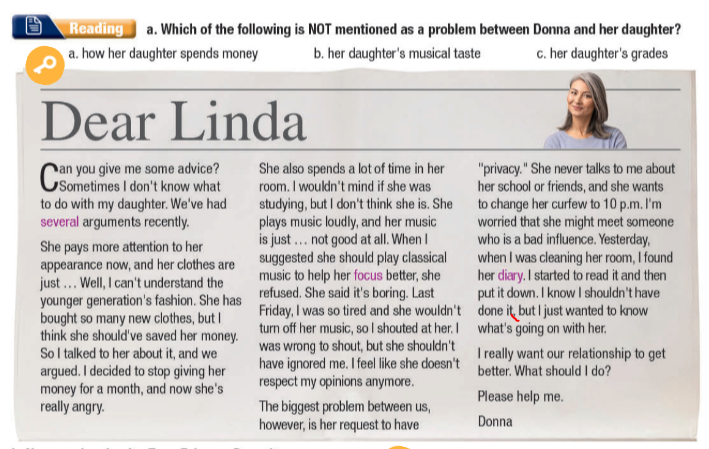
Gợi ý đáp án
c. her daughter’s grades
Hướng dẫn dịch bài đọc
Linda yêu quý
Bạn có thể cho tôi một lời khuyên? Đôi khi tôi không biết phải làm gì với con gái mình. Gần đây chúng tôi đã có một số tranh luận.
Bây giờ con bé chú ý đến ngoại hình của mình hơn, và quần áo của con bé chỉ là ... Chà, tôi không thể hiểu được thời trang của thế hệ trẻ. Con bé đã mua rất nhiều quần áo mới, nhưng tôi nghĩ con bé nên tiết kiệm tiền của mình. Vì vậy, tôi đã nói chuyện với con bé về điều đó, và chúng tôi đã tranh luận. Tôi quyết định ngừng đưa tiền cho con bé trong một tháng, và bây giờ con bé thực sự tức giận.
Con bé cũng dành nhiều thời gian trong phòng của mình. Tôi sẽ không phiền nếu con bé đang học, nhưng tôi không nghĩ con bé như vậy. Con bé bật nhạc rất to, và âm nhạc của con bé thì... không hay chút nào. Khi tôi đề nghị con bé nên chơi nhạc cổ điển để giúp con bé tập trung tốt hơn, con bé đã từ chối. Con bé nói nó thật nhàm chán. Thứ sáu tuần trước, tôi quá mệt mỏi và con bé không tắt nhạc, vì vậy tôi đã hét vào mặt con bé. Tôi đã sai khi hét lên, nhưng lẽ ra con bé không nên phớt lờ tôi. Tôi có cảm giác như con bé không tôn trọng ý kiến của tôi nữa.
Tuy nhiên, vấn đề lớn nhất giữa chúng tôi là yêu cầu của con bé về "sự riêng tư". Con bé không bao giờ nói chuyện với tôi về trường học hay bạn bè của con bé, và con bé muốn thay đổi giờ giới nghiêm thành 10 giờ tối. Tôi lo lắng rằng con bé có thể gặp một người có ảnh hưởng xấu. Hôm qua, khi tôi đang dọn phòng con bé, tôi tìm thấy cuốn nhật ký của con bé. Tôi bắt đầu đọc nó và sau đó đặt nó xuống. Tôi biết lẽ ra tôi không nên làm thế, nhưng tôi chỉ muốn biết chuyện gì đang xảy ra với con bé.
Tôi thực sự muốn mối quan hệ của chúng tôi trở nên tốt hơn. Tôi nên làm gì?
Làm ơn giúp tôi.
Donna
b. Now, read and write True, False, or Doesn't say.
(Bây giờ, hãy đọc và viết Đúng, Sai hoặc Không nói.)
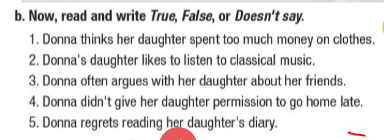
Gợi ý đáp án
|
1. True |
2. False |
3. Doesn’t say |
4. Doesn’t say |
5. True |
c. Listen and read.
(Nghe và đọc.)
Bài nghe
d. In pairs: What do you think Donna should do? Why?
(Làm việc theo cặp: Bạn nghĩ Donna nên làm gì? Tại sao?)
Gợi ý đáp án
I think Donna should listen more to her daughter's needs and aspirations because doing so will help her understand the difficulties her daughter is facing.
Grammar Meaning & Use
a. Look at the picture. What do you think the girl is saying?
(Nhìn vào bức tranh. Bạn nghĩ cô gái đang nói gì?)

Gợi ý đáp án
I should’ve called you yesterday.
b. Now, listen and check your ideas.
(Bây giờ, hãy lắng nghe và kiểm tra ý tưởng của bạn.)
Bài nghe
c. Listen and repeat.
(Lắng nghe và lặp lại.)
Bài nghe
Grammar Form & Practice
a. Fill in the blanks with a perfect modal and the correct verb form.
(Điền vào chỗ trống với thể hoàn thành và dạng động từ đúng.)
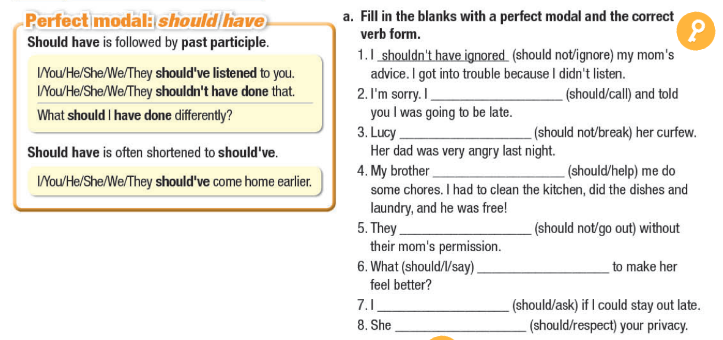
Gợi ý đáp án
|
1. shouldn’t have ignored |
2. should’ve called |
3. shouldn’t have broken |
4. should’ve helped |
|
5. shouldn’t have gone out |
6. should I have said |
7. should’ve asked |
8. should’ve respected |
b. Circle should've or shouldn't have.
(Khoanh tròn nên có hoặc không nên có.)
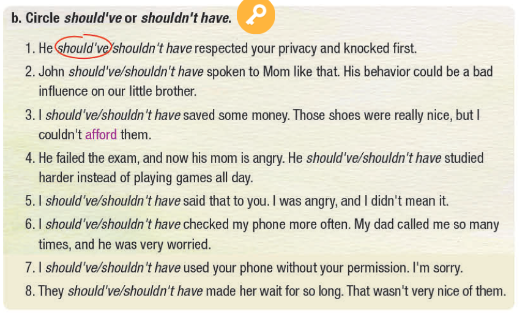
Gợi ý đáp án
|
1. should’ve |
2. shouldn’t have |
3. should’ve |
4. should’ve |
|
5. shouldn’t have |
6. should’ve |
7. shouldn’t have |
8. shouldn’t have |
c. In pairs: Talk about three regrets you have had at school.
(Theo cặp: Nói về ba điều hối tiếc mà bạn đã có ở trường.)

I got a bad score. I shouldn't have waited until the night before to write my essay.
(Tôi đã bị điểm kém. Tôi lẽ ra không nên đợi đến tối hôm trước để viết bài luận của mình.)
I didn't understand the physics lesson. I should've asked my teacher for help.
(Tôi không hiểu bài học vật lý. Tôi lẽ ra nên nhờ giáo viên của tôi giúp đỡ.)
Gợi ý đáp án
- I didn't have many friends at school. I should have opened up and made friends with my classmates more.
- I didn't understand the math problem yesterday. I should have focused on listening to the lecture to understand it.
- I misunderstood my friend. I should have calmed down and apologized to him.
Pronunciation
a. After a consonant, '... have ...' is often contracted to ('ve) and is pronounced / əv/. '... should have ...' is written '... should've ...' and sounds like /' ʃʊdǝv/.
(Sau một phụ âm, '... have...' thường được rút gọn thành ('ve) và được phát âm là /əv/. '... should have ...' được viết là '... should've ...' và nghe giống như /' ʃʊdǝv/.)
b. Notice the sound changes of the underlined word.
(Chú ý sự thay đổi âm thanh của từ được gạch chân.)
Bài nghe
c. Listen and cross out the one with the wrong sound changes.
(Nghe và gạch bỏ từ thay đổi âm sai.)
Bài nghe
Gợi ý đáp án
He should've left earlier.
=> Wrong. Doesn't use weak form.
d. Read the sentences with the correct sound changes to a partner.
(Đọc các câu với âm thanh chính xác thay đổi với bạn của mình.)
Practice
a. Take turns asking what the people should have done differently. Use the prompts to say what they should’ve and shouldn’t have done.
(Thay phiên nhau hỏi xem mọi người nên làm gì khác đi. Sử dụng lời nhắc để nói những gì họ nên làm và không nên làm.)
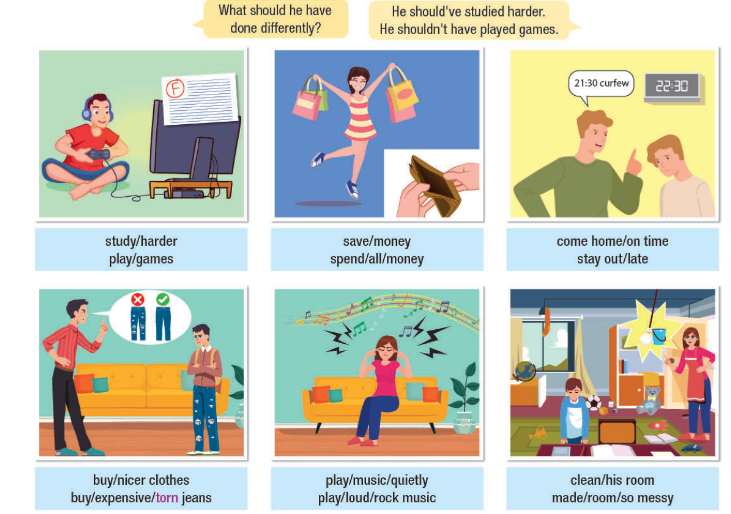
Gợi ý đáp án
A: What should she done differently?
B: She should’ve saved money. She shouldn’t have spent all her money.
A: What should he done differently?
B: He should’ve come home on time. He shouldn’t have stayed out late.
A: What should he done differently?
B: He should’ve bought nicer clothes. He shouldn’t have bought expensive torn jeans.
A: What should she done differently?
B: She should’ve played music quietly. She shouldn’t have played loud rock music.
A: What should he done differently?
B: He should’ve cleaned his room. He shouldn’t have made room so messy.
b. Discuss what can be done to avoid these situations.
(Thảo luận về những gì có thể được thực hiện để tránh những tình huống này.)
He should make a habit of studying before playing.
(Anh ta nên tạo thói quen học trước khi chơi.)
Gợi ý đáp án
- She should make a habit of saving before shopping.
- He should make a habit of coming home on time before curfew.
- He should make a habit of buying nicer clothes before being scolded by his father.
- She should make a habit playing music quietly before affecting the people around her.
- He should make a habit of cleaning his room every day before playing.
Speaking
FAMILY ARGUMENTS: WHAT THEY SHOULD'VE DONE
(TRANH LUẬN TRONG GIA ĐÌNH: HỌ ĐÁNG LẼ RA NÊN LÀM GÌ)
a. Some of your friends have told you about their family problems, and you're talking about it with another friend. In pairs: Read the situation and discuss what the people should have done differently. Then, think of a solution for each situation.
(Một số người bạn của bạn đã nói với bạn về những vấn đề gia đình của họ và bạn đang nói về điều đó với một người bạn khác. Theo cặp: Đọc tình huống và thảo luận xem mọi người nên làm gì khác đi. Sau đó, nghĩ ra giải pháp cho từng tình huống.)
A: What should Tom have done differently?
(Tom nên làm gì khác đi?)
B: Tom shouldn't have ignored his dad's advice.
(Tom không nên bỏ qua lời khuyên của cha mình.)
A: Yes, but his dad should've explained why he didn't like Tom's friend.
(Đúng, nhưng bố của cậu ấy nên giải thích tại sao ông ấy không thích bạn của Tom.)
B: That's right. I think in the future, Tom should...
(Đúng rồi. Tôi nghĩ trong tương lai, Tom nên...)
(1) Tom got in trouble for hanging out with a friend 1 his dad doesn't like. But Tom's dad never told him why he didn't like his friend.
(Tom gặp rắc rối vì đi chơi với một người bạn mà bố anh ấy không thích. Nhưng bố của Tom không bao giờ nói với anh ấy lý do tại sao ông ấy không thích bạn của cậu ấy.)
(2) Mary's mom bought clothes for her. Mary doesn't like the clothes and never wears them. Her mom is angry.
(Mẹ của Mary đã mua quần áo cho cô ấy. Mary không thích quần áo và không bao giờ mặc chúng. Mẹ cô tức giận.)
(3) Jane went to see a movie without telling her dad. She broke her curfew and didn't answer her dad's phone calls. He was very angry.
(Jane đi xem phim mà không nói với bố. Cô ấy đã phá vỡ lệnh giới nghiêm của mình và không trả lời điện thoại của bố cô ấy. Ông ấy rất tức giận.)
(4) John's mom wanted to check on him. She came into his bedroom without knocking, and John was not happy.
(Mẹ của John muốn kiểm tra anh ấy. Bà ấy vào phòng ngủ của anh mà không gõ cửa, và John không vui.)
Gợi ý đáp án
1. A: What should Tom have done differently?
B: Tom shouldn't have ignored his dad's advice.
A: Yes, but his dad should've explained why he didn't like Tom's friend.
B: That's right. I think in the future, Tom should play with friends of good character and listen to his father's advice.
2. A: What should Mary have done differently?
B: Mary shouldn’t have ignored her mom’s care.
A: Yes, but her mom should’ve found out her daughter's preferences and style of dress.
B: That’s right. I think in the future, Mary should share with your mother about her hobbies and clothing styles.
3. A: What should Jane have done differently?
B: Jane shouldn’t have ignored her dad’s phone calls.
A: Yes, but her dad should’ve asked his daughter why she's late and give her gentle advice.
B: That’s right. I think in the future, Jane should ask her father's permission before going out and coming home on time to give her dad peace of mind.
4. A: What should John have done differently?
B: John shouldn’t have ignored his mom’s care.
A: Yes, but his mom should’ve knocked on the door before entering John's room.
B: That’s right. I think in the future, John should tell his mother about knocking before entering the room to ensure his privacy.
b. Which of the above situations have you been in? What did you and your parents do? Why?
(Bạn đã từng rơi vào trường hợp nào trong số những trường hợp trên? Bạn và bố mẹ bạn đã làm gì? Tại sao?)
Gợi ý đáp án
I was once in the same situation as Jane. I apologized, gave my parents a reason why I didn't answer the phone, and assured them that it wouldn't happen again after I came home. My parents accepted my apologies after hearing what I had to say, gave me some wise counsel, and gave me a big hug.
We came to this decision together because I want to share and increase my parents' trust in me, and they don't want to put pressure on our kids.
Hướng dẫn dịch
Tôi đã từng ở trong hoàn cảnh tương tự như Jane. Tôi xin lỗi, cho bố mẹ biết lý do tại sao tôi không bắt máy và cam đoan với họ rằng chuyện đó sẽ không xảy ra nữa sau khi tôi về nhà. Cha mẹ tôi đã chấp nhận lời xin lỗi của tôi sau khi nghe những gì tôi phải nói, cho tôi những lời khuyên khôn ngoan và ôm tôi thật chặt.
Chúng tôi cùng nhau đi đến quyết định này vì tôi muốn chia sẻ và tăng cường sự tin tưởng của bố mẹ dành cho tôi, đồng thời họ không muốn gây áp lực cho con cái chúng tôi.
Trên đây là Lesson 2 unit 2 tiếng Anh lớp 11 i-Learn Smart World trang 18 đầy đủ nhất.








